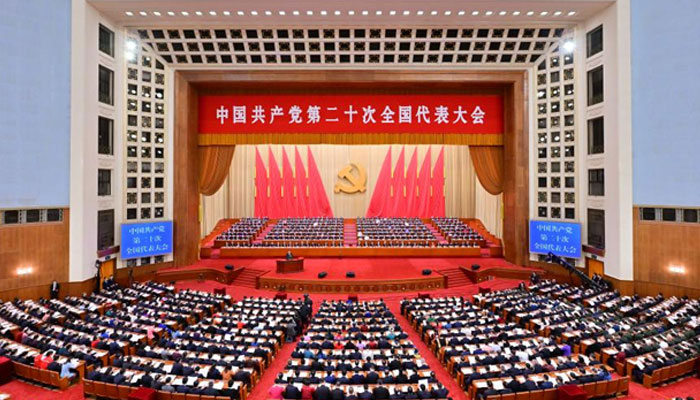China passes law granting Communist Party more control over cabinet
Newly added articles stress that the State Council must resolutely uphold the Party Central Committee’s authority
BEIJING: China’s parliament on Monday revised a law to effectively grant the Communist Party more executive control over China’s cabinet, the State Council, after cancelling the premier’s post-parliament news conference for the first time in three decades. The amended State Council Organic Law passed by 2,883 delegate votes, with eight opposing and nine abstaining, during the closing day of the National People’s Congress in Beijing.
It was the latest in a series of measures in recent years that have gradually eroded the executive authority of the State Council, helmed by Chinese Premier Li Qiang, which nominally oversees China’s 21 government ministries as well as local governments.
Legal experts say the amendment of the State Council Organic Law for the first time since 1982 continues a trend of transferring more power from the state into the Party’s hands, leaving the government to faithfully implement Party directives.
Newly added articles stress that the State Council must “resolutely uphold the Party Central Committee’s authority and its centralised and unified leadership” and follow Xi Jinping Thought, the party’s name for the president’s signature ideology, which expounds on subjects ranging from diplomacy to culture.
“This is a significant shift in the reorganization of executive authority in China,” said Ryan Mitchell, a law professor at the Chinese University of Hong Kong. “While it is always clear that the head of the Party is the most influential figure in the overall hierarchy, the exact division of labour in policymaking and, especially, oversight of policy execution, can be opaque.”
-
 Nick Jonas Gets Candid About His Type 1 Diabetes Diagnosis
Nick Jonas Gets Candid About His Type 1 Diabetes Diagnosis -
 King Charles Sees Environmental Documentary As Defining Project Of His Reign
King Charles Sees Environmental Documentary As Defining Project Of His Reign -
 James Van Der Beek Asked Fans To Pay Attention To THIS Symptom Before His Death
James Van Der Beek Asked Fans To Pay Attention To THIS Symptom Before His Death -
 Portugal Joins European Wave Of Social Media Bans For Under-16s
Portugal Joins European Wave Of Social Media Bans For Under-16s -
 Margaret Qualley Recalls Early Days Of Acting Career: 'I Was Scared'
Margaret Qualley Recalls Early Days Of Acting Career: 'I Was Scared' -
 Sir Jackie Stewart’s Son Advocates For Dementia Patients
Sir Jackie Stewart’s Son Advocates For Dementia Patients -
 Google Docs Rolls Out Gemini Powered Audio Summaries
Google Docs Rolls Out Gemini Powered Audio Summaries -
 Breaking: 2 Dead Several Injured In South Carolina State University Shooting
Breaking: 2 Dead Several Injured In South Carolina State University Shooting -
 China Debuts World’s First AI-powered Earth Observation Satellite For Smart Cities
China Debuts World’s First AI-powered Earth Observation Satellite For Smart Cities -
 Royal Family Desperate To Push Andrew As Far Away As Possible: Expert
Royal Family Desperate To Push Andrew As Far Away As Possible: Expert -
 Cruz Beckham Releases New Romantic Track 'For Your Love'
Cruz Beckham Releases New Romantic Track 'For Your Love' -
 5 Celebrities You Didn't Know Have Experienced Depression
5 Celebrities You Didn't Know Have Experienced Depression -
 Trump Considers Scaling Back Trade Levies On Steel, Aluminium In Response To Rising Costs
Trump Considers Scaling Back Trade Levies On Steel, Aluminium In Response To Rising Costs -
 Claude AI Shutdown Simulation Sparks Fresh AI Safety Concerns
Claude AI Shutdown Simulation Sparks Fresh AI Safety Concerns -
 King Charles Vows Not To Let Andrew Scandal Overshadow His Special Project
King Charles Vows Not To Let Andrew Scandal Overshadow His Special Project -
 Spotify Says Its Best Engineers No Longer Write Code As AI Takes Over
Spotify Says Its Best Engineers No Longer Write Code As AI Takes Over




